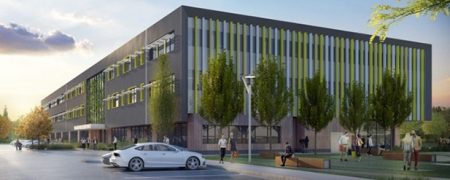May 29, 2017 – A new construction site at University of Waterloo will participate in a pilot project aimed at creating a zero-carbon building. The Canada Green Building Council (CaGBC), a non-profit that manages LEED building construction certification, a sustainability standard for new buildings, has now developed recommendations that will be tested in this new project. CaGBC standards are aimed at helping Canada meet its 2030 emission targets under the Paris Climate Agreement.
Net-zero buildings are defined as new buildings above 2,322.5 square meters (25,000 square feet). As reported in today’s Globe and Mail, Waterloo, Ontario’s Cora Group at University of Waterloo, have launched the Evolv1 development, a two-year pilot which Thomas Mueller, President of CaGBC describes as an effort “to really push the market forward to innovate to deliver low, or zero-carbon buildings in Canada.”
The Evolv1 building will be a 3-storey, 9,290 square-meter (100,000 square foot) grid-independent building. Building features include:
- triple-glazed windows
- smart, dimmable LED lighting
- a green wall
- a rainwater harvesting facility
- a high-performance building envelope
- passive air temperature management
- 1.5 acres of 700-kilowatt solar panels
- geothermal heating and cooling exchange system
- electric vehicle charging stations
Cora’s COO, Adrian Conrad, states, “Our objective is that we want to create a replicable, net-positive-energy building, meaning we are going to generate more power than the building consumes…We want to demonstrate you can do this with a solid business case. … There is a slight incremental cost for doing this and we’re going to be figuring what it is through the process. But our calculations are that it will be more than offset by the savings in energy.”
The company has plans to build a second Net-zero project across the street and hopes to learn from Evolv1 and apply that to Evolv2 which may even prove a better standard for future construction.

There are 16 Net-zero projects participating in the pilot. Among these are:
- MacKimmie Complex, University of Calgary, Calgary, Alberta
- Three buildings in Toronto including the Region Conservation Authority headquarters, the federal government’s Arthur Meighen Building in mid-town (right around the corner from where I live), and a 45-storey office tower in the downtown
- A combined residential-commercial building in Guelph, Ontario
- The Joyce Centre for Partnership & Innovation, Mohawk College, Hamilton, Ontario
- An elementary school in Saint-Eustache, Quebec
- A warehouse in Dartmouth, Nova Scotia
- Four projects in British Columbia including a fire hall, a 10-storey building and mixed-use development in Vancouver, as well as the Health Sciences Centre and EcoLock Carbon Capture storage facility in Kelowna.
Throughout the build and in follow-up monitoring, CaGBC will provide technical support to help contractors implement best industry standards for net-zero carbon results. Collectively, the goal is to gain knowledge from all of the projects to then implement net-zero and carbon-neutral standards for all new construction and retrofits within Canada. The City of Vancouver is among the first jurisdiction in the country to set a carbon-neutral standard for all new buildings and a target emission reduction of 20% from 2007 levels by 2020 for all older residential and commercial construction, not including single-family and low-rise residential housing.









